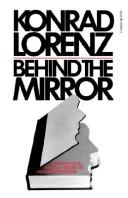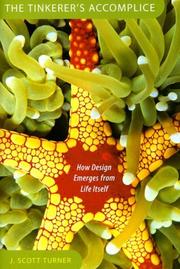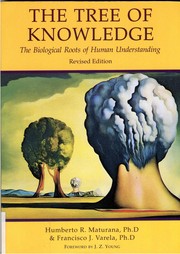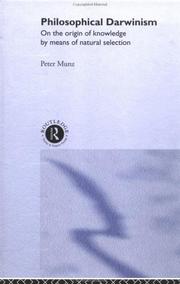Behind the mirror: a search for a natural history of human knowledge by Konrad Lorenz - ISBN 0156117762 - Harvest/HBJ 1978
note that this was finished much earlier but without recall, recall starts a month before the current date to already start with very spaced recalls
Motivation
Evolutionary Epistemology page on Wikipedia.
Pre-reading model
Draw a schema (using PmGraphViz or another solution) of the situation of the area in the studied domain before having read the book.
Reading
- Introduction - Epistemological prolegomena
- "The physiological mechanism whose function it is to understand the real world is no less real than the world itself. This very obverse is the subject of my book." (p19)
- Life as a process of learning
- "as a Viennese friend of mine once put it, <<Life feeds on negative entropy>>" (p21)
- The creation of new system characteristics
- "Thorpe demonstrated that the most important creative principle in evolution is the emergence of a totality from a mass of different parts which become more and more dissimilar in the process - as well as more dependent on each other." (p32)
- Strata of existence
- Summary at the end of the chapter
- Short-term information gain
- Adaptive modifications of behavior
- Feedback of experience: conditioning by reinforcement
- The roots of conceptual thought
- The human mind
- Culture as a living system
- Factors making for the invariance of culture
- Culture and change
- Symbols and language
- The aimlessness of cultural development
- Oscillation and fluctuation as cognitive functions
- Behind the mirror
- quoting Donald Campbell, including in references Evolutionary epistemology (to check too)
See also
- "Our cognitive apparatus is itself an objective reality which has acquired its present form through contact with and adaptation to equally real things in the outer world." K. Lorenz (1976), Behind the Mirror
- in "Model Formation and the Role of Semantics", page 164 of The Mind vs. the Computer in The Crucible of Consciousness
- Wikipedia:Behind the Mirror: A Search for a Natural History of Human Knowledge

- "Evolution is the process of growing perception of the outer world by living nature itself."
- Teleonomy according to Wikipedia
- "quality of apparent purposefulness and of goal-directedness of structures and functions in living organisms that derive from their evolutionary history, adaptation for reproductive success, or generally, due to the operation of a program."
- Genetic Philosophy Of Education by G. E . Partridge, Sturgis amp Walton 1912
- Le cerveau en mirroir : La supériorité intellectuelle de l'être humain sur le monde du vivant serait-elle une fiction collective?, Arte 2008
- From Evolutionary Epistemology Via Selection Theory to a Sociology of Scientific Validity adapted from Donald T. Campbell
- referring to Lorenz, K. (1973) Die Ruckseite des Spiegels. Munich: Piperverlag. (Translated as Behind the mirror. New York: Harcourt Brace Iovanovich, 1973).
- my Cognition#CognitiveMirror and Mind explorations* Philosophy and the Mirror of Nature by Richard Rorty, Princeton University Press 1981
Overall remarks and questions
- quoting a friend "Life feeds on negative entropy." (p20)
- one could consider this quote in the light of information transfert rate (ITR) used a measure in brain-machine intefaces (BMI)
- how can the conclusion (p243) and evolutionary epistemology overall be applied? By applying popularity as selection (a la PageRank which seems to be showing its limit)?
Synthesis
So in the end, it was about X and was based on Y.
Critics
Point A, B and C are debatable because of e, f and j.
Vocabulary
(:new_vocabulary_start:)
new_word
(:new_vocabulary_end:)
Post-reading model
Draw a schema (using PmGraphViz or another solution) of the situation of the area in the studied domain after having read the book. Link it to the pre-reading model and align the two to help easy comparison.
Categories
Back to the Menu
Other read books linking to the BehindTheMirror page :
Back to the Menu
 Fabien Benetou's PIM
Fabien Benetou's PIM









